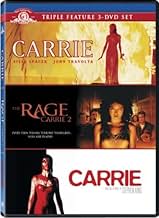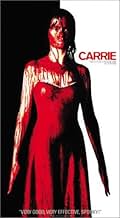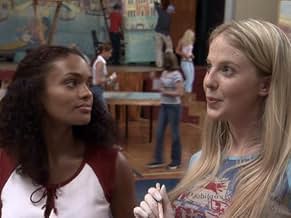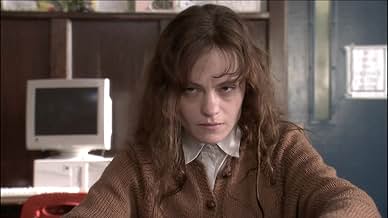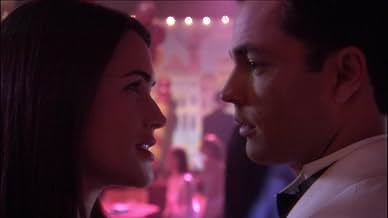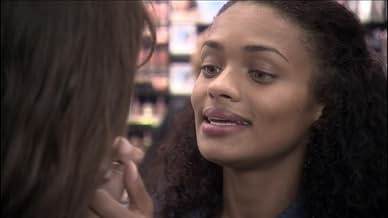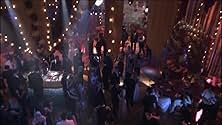Carrie White is a lonely and painfully shy teenage girl with telekinetic powers who is slowly pushed to the edge of insanity by frequent bullying from both her classmates and her domineering... Read allCarrie White is a lonely and painfully shy teenage girl with telekinetic powers who is slowly pushed to the edge of insanity by frequent bullying from both her classmates and her domineering, religious mother.Carrie White is a lonely and painfully shy teenage girl with telekinetic powers who is slowly pushed to the edge of insanity by frequent bullying from both her classmates and her domineering, religious mother.
- Awards
- 2 nominations total
- Lou Garson
- (as Tyler Foley)
- Little Carrie
- (as Jodelle Micah Ferland)
- Director
- Writers
- All cast & crew
- Production, box office & more at IMDbPro
Featured reviews
So, do the performances justify the film? Kind of. A screening of "May" is what convinced the producers that Angela Bettis was the perfect choice for the role of Carrie. No doubt, the two characters are similar, disenfranchised loners who strike back violently against their tormentors. However, Angela Bettis makes Carrie not only very different from May but different from Sissy Spacek's Carrie. Spacek played the character as a wounded animal. Bettis' Carrie, meanwhile, plays like a PTSD victim. She keeps her head down, taking abuse silently. She's more spastic, seemingly going into seizure like trances. Bettis' naturally nervous qualities are played up, her eyes and forehead twitching. However, this Carrie has a secret rage burning inside of her. She bottles up her anger at the world. A more bitter or even sarcastic side shows through during her interactions with mother or schoolmates. Spacek's Carrie was a poor girl who snaps suddenly, unexpectedly. Bettis' Carrie is a ticking time bomb. The differing interpretation allows Angela to make the part her own. It's a very good performance from a great actress.
Patricia Clarkson also goes in a very different direction from what Piper Laurie did in the original. Laurie played the role as over-the-top, high opera. Clarkson goes in the opposite direction. Her Margaret White rarely raises her voice. Her threats are quiet and subtle. She doesn't have to yell and scream to make her point. She plays her religious fanaticism as a frightening truth, someone who believes unerringly. Clarkson is excellent, far more believable then Laurie's campy theatrics. It's the only true advantage the 2002 version has over the 1976 version.
The 133-minute long film, originally aired in two halves over two nights, hews more closely to Stephen King's original novel. It reinstates the epistolary format, a police detective interviewing the surviving high school students about what happened that night, the events recalled in flashback. The narrative reshuffling does little to change the flow of the story. Carrie still gets her period in the girl's changing room, freaks out, discovers her powers, faces her religious fanatic mother, gets invited to the prom by Tommy Ross, has pig's blood dumped on her, goes nuts and kills a lot of people. Several missing scenes from the book are reinserted. Small meteorites fall from the sky when Carrie is born. When she's six years old, after an encounter with the neighbor's daughter, the same thing happens. After the massacre at the prom, Carrie walks through Chamberlain, Maine, destroying most of the town.
I'm not sure how to feel about the extended run time. In some ways, it allows the material to breathe more. A few of the additional scenes add nice character development. Chris Hargensen has a scene where she interacts with Carrie alone, that shows Chris to have some depth as a character. When Kandyse McClure's Sue Snell talks to Carrie about make-up, it's humorous, expands on the two's relationship, and provides more insight in Carrie's opinions. The pre-massacre prom scenes are surprisingly good. Carrie and Tommy Ross talking in the car is unusually sweet. Miss Desjarden's monologue to Carrie about post-high school life is wonderful as well, especially Carrie's reaction to it. As Carrie and Tommy dance, Angela gets a great moment, expressing gratitude to the young man. The detective subplot doesn't add much but the cop looking through Carrie's completely empty, unsigned year book is rather heartbreaking. Then again, several scenes are unnecessarily extended. The pig bleeding scene goes on far too long. A moment of Carrie freaking out in class, shattering her desk, adds nothing. The principal talking with a lawyer has no effect on the rest of the film. Though Emilie de Raven's Chris is less blatantly psychotic then Nancy Allen's, her boyfriend Billy becomes a cold sociopath for no particular reasons.
The biggest problem with 2002's "Carrie" is that it can't compete with the 1976's version thrills. The CGI-filled prom massacre lacks the visceral punch of the original. DePalma's unique style ramped up the intensity. David Carson's comparatively flat direction adds little. The rampage through town is well executed but seems superfluous. Carrie's powers are often overdone, with her cracking desk, throwing bikes through the air, or wrapping a truck around a tree. Considering Carrie's obvious anger, her not having any memory of the rampage is a cheat. Laura Karpman's score isn't bad, blatantly recalls Pino Dinaggio's work at times, but isn't as impressive.
Of course, the ending is different. For some reason, producer Bryan Fuller decided "Carrie" would make a great set-up for a series. Carrie White survives and goes on the road with Sue Snell. The series would have been "The Fugitive," with a telekinetic teenage girl as the protagonist. This, of course, was a terrible idea. If 2002's "Carrie" maintained the book's ending, it perhaps would have been a stronger film. As it is, it's not a bad effort. It can't compare to DePalma's version and is frequently mediocre. Still, the two lead actresses lend what otherwise would have been a forgettable product some elegance.
Angela Bettis (GIRL INTERRUPTED) has the unenviable task of stepping into the shoes (and the prom dress) of Sissy Spacek in the title role of a New England teen tortured at school by cruel classmates (because she doesn't belong) and at home by her religiously fanatical mother (Patricia Clarkson, in the Piper Laurie role). Soon, she discovers she has telekinetic powers; and when the most gruesome of gags is played on her on prom night, all bets are off.
Though looking much more glazed in the eyes than Spacek ever did, Bettis gives a fairly good performance as Carrie; and Clarkson's portrayal of her uprighteous mother is much more low-key, but no less threatening, than Laurie's portrayal. The special effects, however obvious they might be, are also quite good. But in the end, the reputation of the 1976 original, with its combination of psychological horror and teen-angst drama, still hovers over this remake. Nowhere is this more apparent than in the pig's blood scene. It doesn't have the same jarring emotional impact this time around--not so much because we've seen it before, but because here it looks slightly laughable when the blood gets poured onto Bettis. Because of DePalma's use of slow-motion in the original, the blood hits Spacek like a tidal wave.
I give the CARRIE remake a '6' just for trying. I only regret that its shortcomings as a film have less to do with its execution as a film than the fact that the original movie still resonates much more fully.
Did you know
- TriviaBryan Fuller added some more positive dialogue about religion after he was asked to do so by David Keith, so that the film would not appear to be overtly anti-religion. One example is when Carrie makes statements about her own faith as opposed to her mother's views.
- GoofsCarrie's hair is already wet and there is already blood splashed all over the floor when the first drops hit her face.
- Quotes
Margaret White: You've gone so far astray, I fear for you.
Carrie White: You really think I'm going to burn in hell, Momma, just for going to my prom?
Margaret White: I don't want to think about what's going to happen to you. Sin knows you now. It will find you.
Carrie White: Momma...
Margaret White: Your sin will find you, Carrie, and when it does, not even Jesus can help you.
Carrie White: [exasperated] Jesus will help me. He will help me if I really need him.
Margaret White: Not if he doesn't love you anymore.
Carrie White: Jesus loves everybody, Momma - even me!
- Alternate versionsIn an alternate cut of the film, it appears there is a shot of the inside of the gym during the roof collapse where we see characters such as George Dawson, Ruth Gogan and several other character be crushed by the falling debris of the roof.
- ConnectionsFeatured in De Palma (2015)
- SoundtracksOutside, Looking In
Written by Mark Nubar, ShyBoy, and Jeeve
Performed by Hypnogaja
Courtesy of Access Denied Music
Details
Contribute to this page



